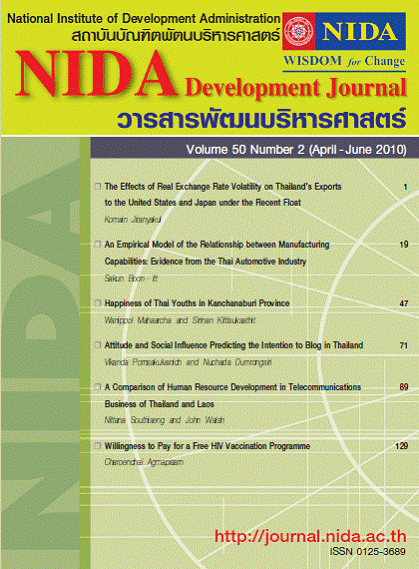The Effects of Real Exchange Rate Volatility on Thailand’s Exports to the United States and Japan under the Recent Float
Keywords:
Real exchange rate uncertainty, Exports, Bounds testing for cointegration JEL Classification, F31, C22Abstract
This paper investigates whether the real exchange rate uncertainty depresses Thailand’s exports to the United States and Japan and thus causes the trade balances to deteriorate under the floating exchange rate regime. Monthly data from July 1997 to December 2007 are utilized. Industrial production indexes are used as proxies of real income of the two major trading partners. The results from bounds testing for cointegration show that the variables in the export demand are cointegrated, and the Marshall-Lerner condition still holds in the case of United States. Real exchange rate volatility generated by the ARCH(1) process as a measure of uncertainty has a negative effect on exports to Japan, but has no effect on exports to the United States. However, total exports can be harmed by real exchange rate uncertainty for exports to Japan.
บทความนี้เป็นการศึกษาว่าความไม่แน่นอนในอัตราแลกเปลี่ยนที่แท้จริงมีผลทำให้การส่งออกของไทยไปยังสหรัฐอเมริกาและญี่ปุ่นลดลงหรือไม่ และถ้าเป็นเช่นนั้นจะทำให้ดุลการค้าโดยรวมแย่ลงเมื่อประเทศใช้ระบบอัตราแลกเปลี่ยนลอยตัว ข้อมูลที่ใช้ในการวิเคราะห์เป็นข้อมูลรายเดือนในช่วงเดือนกรกฎาคม 2540 ถึงเดือนธันวาคม 2550 เนื่องจากข้อมูลมีลักษณะความถี่เป็นรายเดือน จึงได้ใช้ดัชนีการผลิตในภาคอุตสาหกรรมของสหรัฐอเมริกาและญี่ปุ่นเป็นตัวแทนรายได้แท้จริงจากต่างประเทศ ผลการทดสอบความสัมพันธ์ระยะยาวในสมการการส่งออกพบว่าตัวแปรในสมการมีความสัมพันธ์ระยะยาว จากสมการส่งออกไปยังประเทศคู่ค้ารายใหญ่ทั้งสองประเทศแสดงว่าเงื่อนไขของมาร์แชลล์และเลินเนอร์มีผลในสมการส่งออกไปยังสหรัฐอเมริกา ส่วนความไม่แน่นอนหรือความผันผวนจากอัตราแลกเปลี่ยนที่แท้จริงมีผลในทางลบกับการส่งออกไปยังญี่ปุ่นแต่ไม่มีผลต่อการส่งออกไปยังสหรัฐอเมริกา อย่างไรก็ดี การส่งออกโดยรวมจะถูกกระทบในทางลบจากความไม่แน่นอนของอัตราแลกเปลี่ยนในกรณีการส่งออกไปยังญี่ปุ่น





